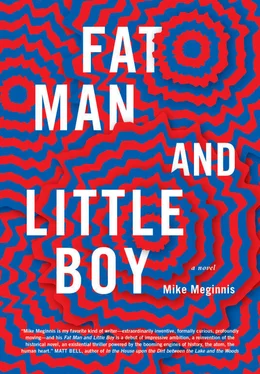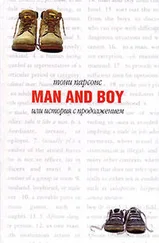The first time Maggie hid beneath the table. Rosie couldn’t help saying that it was a stupid place to hide. Maggie looked as if she might cry until Rosie covered her own eyes and started counting again, this time to fifteen instead of ten. Maggie used the extra five Mississippis to hide on the opposite end of the long table. This time Rosie congratulated her on hiding in “Just about the last place I thought of looking.” Maggie thrust out her tummy with pride and Rosie started counting again. This next time produced the first instant of mounting terror because Maggie left the room. She was only standing on her toes against the wall beside the frame of the door that led to that room, however, and when Rosie went into the room beginning to think she might cry at having lost her daughter forever, there was Maggie, tickling her mother’s butt and shouting “BOO!”
Next Maggie found a bathroom and hid between the tub and pristine toilet. On the wall inside the shower, opposite the showerhead, was a water-damaged painting, once a watercolor, now a blur of gold and purple, red and green, the thick paper wrinkled and flaking. Rosie thought that it was maybe once a sunset.
Next Maggie found a library down the hall. This time Rosie went the wrong way, ending up first in a room containing seven empty birdcages of various sizes, each one’s door hanging open. A large white birdcage empty. A small green birdcage empty. A hanging birdcage empty. Water dishes half-full or plain empty, newspapers sodden or fresh, some cages coated with dust, some perhaps freshly abandoned. There was a small white bird with red eyes perched atop the largest cage. It was very much still there. After a full minute of slowly mounting panic, Rosie found her little girl among the books of the twins’ library.
Now Rosie doesn’t know where Maggie’s hiding. She genuinely does not know. She has found what she believes to be the master bedroom. She checks underneath the beds and in the adjoined bathroom, not because she believes Maggie is here—she can’t hear her daughter’s telltale breathing—but because she wants to see the way the brothers choose to sleep. There are two beds here a dozen feet apart. There is a heavy curtain between them, on runners as in a hospital, which is presently folded, but which might extend so as to divide the room. There are two matching dressers on opposite ends of the room. There is a refrigerator in the bathroom, stocked with beer and cola. There are newspaper clippings taped to the mirror. Some review the brothers’ films, though none of their recent work is represented. Some of the clippings are about bombs. Test Able and Test Baker. These clips are faded. Their ink gone gray, paper yellowed.
Above their matching beds, one picture each. The pictures very large, say ten feet by ten. At first she mistakes them for murals. Rather they are photos inflated far beyond their natural dimensions. Savage in their grain and blur and fuzz. In each photo, a mushroom cloud billows. Gray and black in shadow. Brilliant white where light.
One of these above each bed.
Not matching. There are two.
A different one above each bed.
Rosie has never before felt what she would call a premonition. Now there is something in her knees. Her daughter is still missing.
Fat Man paces the room with all the wax statues, trying his damnedest to explain why it’s wrong to explode, gesturing wildly with the still-closed soda bottle they were just rolling around on his face. The Hanway twins listen intently. The wax policemen are behind him, holding hands on either side.
“People die,” says Fat Man. “Sometimes hundreds of thousands. The land and air are poisoned. People’s skin burns. They are reduced to shadows cast on cement walls. You can’t control who dies. Anyone dies. Everyone dies. You can’t stop it once it’s started. You can’t explode enough . You can only explode.”
“That’s why you do it where there aren’t any people,” says Able.
“Really it’s no trouble, you can both use our island,” says Baker.
“We like to be alone when we do it,” says Able.
“But you can go when we’re not there,” says Baker.
“You’re not getting it,” says Fat Man. “I don’t want to explode. I hate exploding. Little Boy here won’t acknowledge that it’s ever even happened once, he hated it so much.”
“You can’t deny who you are,” says Able.
“Deep thought,” says Baker.
“Any more than you can deny your skin,” says Able.
“Not possible,” says Baker.
“You’re a bomb,” says Able.
“I was a bomb,” says Fat Man. “Now I’m a father. I’m a husband. I’m a brother.”
“You’re a father,” says Able. “That’s true.”
“The kid’s cute,” says Baker.
“We know it was different for you,” says Able.
“There were,” Baker pauses, “circumstances.”
“A war on,” says Able. “People got hurt.”
“So did you,” says Baker.
“We’ve got it easy,” says Able. “We know that.”
“What?” says Little Boy.
Fat Man leers at him with awful violence in his eye.
“But this not-exploding experiment, Fat Man. This thing you’re trying,” says Able. “Has it made you happy?”
Fat Man contemplates the bottle in his hand. Its contents are warming. Its sweat mingles with his. “Nothing makes anyone happy.”
“Who told you that?” says Able.
“You know what makes me happy?” says Baker. “Expressing myself, listening to my body, and giving it whatever it needs.”
“Nothing makes anyone happy,” says Fat Man. He looks to Little Boy. Asks him, “Isn’t that right?”
Little Boy says, “I don’t want to talk about it.”
Little Boy says, “I don’t understand what any of you are talking about.”
Little Boy says, “I’m going to go somewhere else.”
Fat Man says to Little Boy, “Don’t leave me here with them.”
But Little Boy is going to leave.
Fat Man slaps Little Boy’s face as he’s leaving. Little Boy walks right through it, though the impact’s awful loud.
The twins look to each other. They approach Fat Man from both sides and rub his shoulders, so there are their wax cop selves behind him and their twin flesh selves before him, the wax selves stern, the flesh selves kind, eyes overflowing with love, misting now with sympathetic tears.
“Hitting him won’t make you feel any better,” says Able.
“He’s your brother,” says Baker.
“The only one you’ve got,” says Able.
“He’s no brother of mine.”
“You know how we learned to be actors?” says Baker.
“You’ll laugh,” says Able.
They tell him the story of when they first swam to that island shaped like a kidney bean. They tell him how they looked each other in the face and saw nothing. One of them asked the other why he was looking at him that way. The other said he didn’t know what he meant. So what was his face all about, then? Well what about his face? One brother shoved the other. One brother shouted at him to stop it. One brother shouted back. Fat Man asks them don’t they know which one was which. They say that they don’t. One brother punched the other. The other brother pushed him to the ground. They were naked. Their knees beat against each other’s knees. They slapped each other’s faces, and screamed, and wailed, and wept, and rolled around in this way, beating one another. Until they realized their expressions were no longer empty.
“We were emoting,” says Able.
“Quite convincingly,” says Baker.
“As far as we could tell, we were feeling things about each other,” says Able.
Fat Man asks them what in fuck this has to do with him and Little Boy, who feels nothing for him, who doesn’t care enough even to hit him back anymore.
Читать дальше












